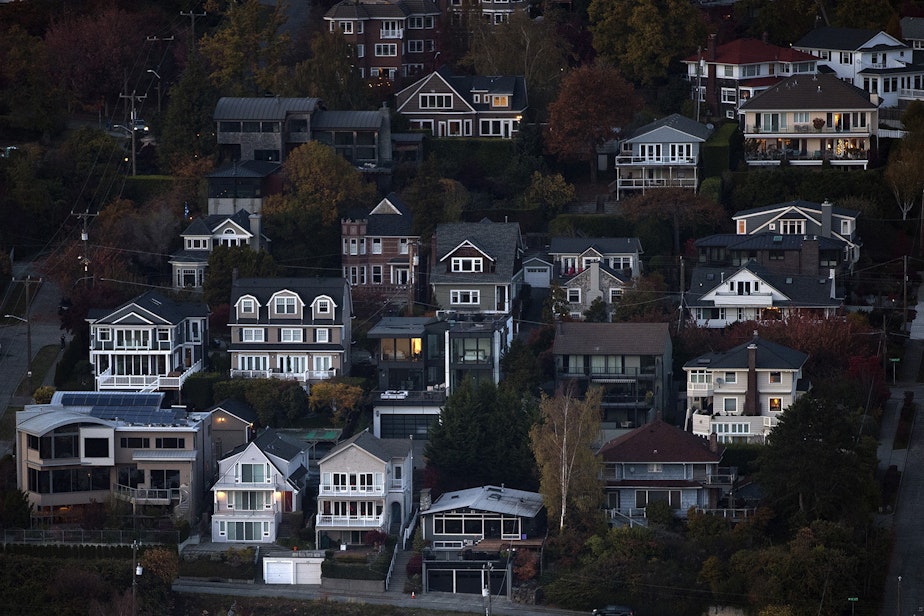Seattle's housing market is going into 'hibernation.' But it's not all good news

After being hot for several months, the local and national housing markets appear to be cooling down.
Or, as Redfin Chief Economist Daryl Fairweather puts it, the market is "going into hibernation."
"Everyone's pulling back right now, because mortgage rates are higher," Fairweather explained. "Buyers pull back because buying a home is more expensive, because you have to pay more on that monthly mortgage payment. And sellers are pulling back because they don't really have a reason to sell. They can just ride out this cold spell."
And that's what Seattle experiencing right now, she said: a cold spell, at least compared to the hyper-competitive market that knocked out many buyers earlier this year.
But those prospective buyers had to go somewhere. Now, the rental market is starting to feel the strain more than ever.
Fairweather spoke with KUOW's Angela King to explain.
This interview with Daryl Fairweather has been edited for clarity.
Sponsored
Angela King: A report by Redfin shows the median rent rate in Seattle increased by more than 30% in May of this year, compared to May of 2021. And the median rent in Seattle? Now more than $3,000. That is unaffordable for lots of folks. Daryl, are there any signs those prices are going to come down?
Daryl Fairweather: I think there's actually even more room for rents to grow, because as people get priced out of buying a home, they're going to be more likely to rent.
You say the Seattle market is going into hibernation. That actually sounds like it could be good news for prospective homebuyers who can handle the recent mortgage rate increases. Where does that number stand right now?
The 30-year fixed-rate mortgage stands at 5.8% currently, compared to below 3% just last year.
Sponsored
And that's important to another recent report from Redfin that might give people a knot in their stomachs. Homebuyers' purchasing power has declined quite a bit. In fact, Redfin found a homebuyer on a $2,500 monthly budget has lost nearly $120,000 in spending power since the end of last year; that's because mortgage rates have nearly doubled, as you just mentioned. Paint the picture and explain what this looks like with some simple numbers if you can.
We calculated the affordability for somebody on a $2,500 monthly mortgage budget, which is affordable to somebody making about $100,000 a year. So, these are ostensibly an upper-middle-class people, right? In Seattle, it used to be that 13.3% of homes were affordable within that budget. And now, it's down to just 5.7% of homes being affordable on that budget. So, it was already really tough to buy a home, even if you made $100,000 in Seattle last year. And now it's gotten nearly impossible.
So, buyers have lost all of this purchasing power. But as you mentioned, demand is slowing down slightly.
Yes. So, if you can still afford a home, the good news is that homes are less likely to face bidding wars. You're more likely to get a home for under asking-price, especially if it's been sitting on the market for more than a week. I think it's a good time to revisit some markets that were just way too competitive earlier in the year. You might get lucky and get a home for less than it was listed for — which was not something that happened just a couple of months ago.
Sponsored
How do you see these trends in the Seattle area affecting working-class families, young professionals and marginalized communities and their ability to stay in Seattle? We know a lot of people have already been forced out of the market.
I think it's going to be very tough for people who don't qualify for any kind of housing assistance and still find themselves priced out, like those people we talked about making $100,000 a year. They likely are stuck in the middle — they're not going to be able to qualify for housing assistance, but they also are going to have a really tough time affording a $3,000-a-month apartment. So, I think people are going to figure out what's best for them.
Some people may leave the city of Seattle for more affordable areas like Tacoma or Spokane, or maybe even Arizona. And for people who stay, they may just have to figure out how to squeeze their budget. But budgets are already being squeezed so much by inflation and gas prices and food prices. Some people just, inevitably, are worse off now than they were last year.
So, what stands out to you when these groups can't afford to stay in major metropolitan areas like Seattle?
It's really a failure of the city — that not enough housing was built, so that the city could grow sustainably. We've known for a long time that people are moving to Seattle, especially as a place like San Francisco gets more expensive. Seattle became more and more attractive, and then Seattle became like San Francisco when all those people moved in, because of how much demand there is for housing. Seattle should have been able to see this coming. The city has done some zoning reforms in recent memory to increase the supply of housing. But it really hasn't been enough to make it so that somebody who could afford to live in the city of Seattle five years ago could still afford it today. I think people just see the goalposts moving further and further out for what it takes to be able to afford to live in a city like Seattle.
Sponsored
Listen to the interview by clicking the play button above.


